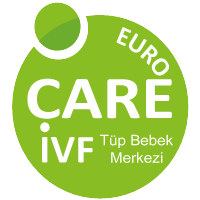The entire EuroCARE team provides you with an all-encompassing fertility care program in the Turkish Republic of Northern Cyprus. With exceptional fertility care and high IVF success rates, EuroCARE IVF is now recognized as one of the top fertility clinics worldwide for infertility treatment, including egg donation, IVF, and IUI.
 Have you been trying to conceive without success? Approximately one in six couples will have difficulty conceiving and may need professional fertility services to diagnose the possible cause(s) of infertility. We are here to help you.
Have you been trying to conceive without success? Approximately one in six couples will have difficulty conceiving and may need professional fertility services to diagnose the possible cause(s) of infertility. We are here to help you.
Female fertility is a woman’s ability to conceive a biological child. Infertility, on the other, hand is the inability to get pregnant with frequent, unprotected sex for at least one year — or at least six months if you’re older than 35 — with no success.
At EuroCARE IVF, treatment plans are individually tailored to meet your needs — and we want you to be involved in the decision-making process. This hands-on approach enables our intended parents to choose the treatment pathway that is most cost-effective for the achievement of a successful pregnancy.
When Should I See a Fertility Specialist?
It is recommended that you should see fertility specialist after a year of unsuccessful, regular unprotected intercourse if the woman is younger than 35 and after six months if the woman is older than 35. One option is to start by speaking with your ob-gyn first, and another is to go directly to a reproductive endocrinologist. A woman’s fertility naturally decreases with age, starting in her late 20s and dropping more rapidly after 35 — and fertility success is no exception.
At EuroCARE IVF, our team can treat various conditions, including:
- Endometriosis
- Polycystic Ovarian Syndrome (PCOS)
- Ovulation problems
- Repeated miscarriages
- Abnormalities of the uterus, fallopian tubes and/or ovaries
Pregnancy — What We Know
The below factors are essential to become pregnant:
- You need to ovulate. To get pregnant, your ovaries must produce and release an egg, a process known as ovulation.
- Your partner needs healthy sperm. For many couples, this isn’t a problem unless your partner has a history of illness or surgery.
- You need to have regular intercourse during your fertile time.
- You need to have open fallopian tubes and a normal uterus. The egg and sperm meet in the fallopian tubes, and the embryo needs a healthy uterus in which to grow.
For pregnancy to occur, every step of the human reproduction process has to happen correctly. The steps in this process are:
- One of the two ovaries releases a mature egg.
- The egg is picked up by the fallopian tube.
- Sperm swim up the cervix, through the uterus and into the fallopian tube to reach the egg for fertilization.
- The fertilized egg travels down the fallopian tube to the uterus.
- The fertilized egg implants and grows in the uterus.
Female Infertility Symptoms
- Irregular periods
The average woman’s cycle is 28 days long. Anything beyond that can still be considered normal, as long as your cycles are consistent.
But a woman whose cycles vary so greatly that she can’t keep track of when her period is going to start might question her fertility. Hormonal imbalance and polycystic ovarian syndrome (PCOS) are the potential causes of your irregular periods. And both of these can contribute to infertility.
- Painful or heavy periods
Milds cramps during menstrual periods in women are considered normal. But if pain interferes with your daily life, this may be a symptom of endometriosis.
- No periods
Factors like stress or heavy physical activities can cause your period to temporarily disappear. If your period disappears for a prolonged period of time, then it would better to get your fertility checked.
- Symptoms of hormone fluctuations
Hormone fluctuations can affect fertility of women. Some of the signs of hormonal disbalance are:
- skin issues
- reduced sex drive
- facial hair growth
- thinning hair
- weight gain
- Pain during sex
Painful sex can be related to hormone issues, endometriosis, or other conditions that can also contribute to your infertility.
Female Infertility Causes
A number of medical issues can contribute to female infertility:
Ovulation disorders (irregular/no ovulation; accounts for infertility in approximately 1 in 4 infertile couples.
- Polycystic ovary syndrome (PCOS); causes a hormone imbalance, which affects ovulation and is the most common cause of female infertility.
- Hypothalamic dysfunction; two hormones produced by the pituitary gland are responsible for stimulating ovulation each month (FSH) and luteinizing hormone (LH).
- Premature ovarian failure; the premature loss of eggs from your ovary (perhaps from genetics or chemotherapy).
- Hyperprolactinemia; the pituitary gland may cause excess production of prolactin hormone which reduces estrogen production and may cause infertility.
Tubal Infertility; meaning damage to the fallopian tubes can prevent sperm from reaching the egg or block the way of the fertilized egg to the uterus. Causes can include:
- Pelvic inflammatory disease; an infection of the uterus and fallopian tubes due to chlamydia, gonorrhea or other sexually transmitted infections
- Previous surgery; in the abdomen or pelvis, including surgery for ectopic pregnancy (where the egg implants and develops in a fallopian tube instead of the uterus).
- Pelvic tuberculosis; a major cause of tubal infertility.
Uterine or cervical causes; can interfere with implantation of the fertilised egg or increase the chance of miscarriage.
- Fibroids / polyps; are common in the uterus. Some can block fallopian tubes or interfere with implantation, affecting fertility.
- Endometriosis; when tissue that makes up the uterine lining grows outside the uterus. This can cause scarring, which may block fallopian tubes and keep an egg and sperm from meeting. Endometriosis can also affect the lining of the uterus, affecting implantation of the fertilized egg.
- Abnormalities present from birth; for example an abnormally shaped uterus can cause problems becoming or remaining pregnant.
- Cervical stenosis; a narrowing of the cervix can be caused by an inherited malformation or damage to the cervix.
Other medical conditions are; diabetes, celiac disease, autoimmune diseases such (lupus).
Other factors that can affect fertility are:
- Age; a crucial factor that impacts fertility of women. Advanced reproductive age can put the child at a risk of mental health / developmental disorders.
- Smoking; can damage your cervix and fallopian tubes. It also increases your risk of miscarriage and ectopic pregnancy. It’s also been suggested to age your ovaries and deplete your eggs prematurely.
- Weight; overweight / significantly underweight may affect normal ovulation.
- Sexual history; sexually transmitted infections such as chlamydia and gonorrhea can damage the fallopian tubes.
Unexplained infertility is also common in couples around the globe. This is when, frustratingly, the cause of infertility is not detected.
Female Fertility Testing at EuroCARE IVF
The first stage of the IVF process is undergoing fertility tests and establishing diagnosis. The blood test results will indicate the level of hormones that will determine the treatment plan on a personal level.
AMH (Anti-Mullerian Hormone). Gives an indication of a woman’s egg reserve. Women are born with their lifetime supply of eggs which gradually decrease in quantity and quality with age. AMH is a hormone secreted by cells in developing eggs sacs (follicles). A high AMH level indicates a good egg reserve, a low AMH level then we expect a lower response from the ovaries during the treatment. The medication protocol is determined to take this into account.
TSH (Thyroid Stimulating Hormone). This tests checks for thyroid gland problems. The TSH level can have an effect on the treatment. If the level is greater than 2.5, medication will be prescribed to lower it. A normal TSH level guards against infertility and conception problems (ovarian and implantation related), miscarriage, premature birth, pre-eclampsia, low birth weight and mental problems in the baby. A newly developing fetus relies on its mother’s thyroid function.
Prolactin hormone. During the IVF treatment cycle the medication used stimulates egg growth and thickens the womb lining. The lining must be an adequate thinkness in order to give the embryos the best chance of implantation. Even slightly raised levels of Prolactin can interfere with the response of the womb lining to estrogen as well as affect ovarian follicle growth and development, thereby reducing reproductive potential. Medication can be taken in order to reduce the levels of Prolactin in the lead up to the treatment if necessary.
Trans-vaginal untrasound scan: Antral follicle count & womb lining check. This scan will count the number of follicles in the ovaries giving a further indication of the egg reserve. The scan also checks for any anomalies that could affect the outcome of the treatment. For example; ovarian cysts that can affect the follicle development or fibroids / polyps that can prevent implantation.Resources:
https://www.mayoclinic.org/diseases-conditions/female-infertility/symptoms-causes/syc-20354308
